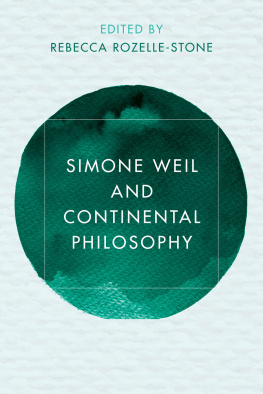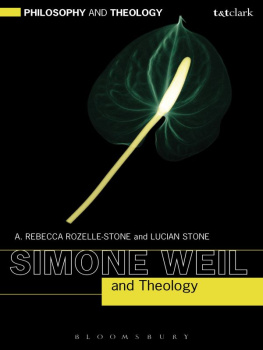Simone Weil - The Need for Roots
Here you can read online Simone Weil - The Need for Roots full text of the book (entire story) in english for free. Download pdf and epub, get meaning, cover and reviews about this ebook. publisher: Taylor and Francis, genre: Science. Description of the work, (preface) as well as reviews are available. Best literature library LitArk.com created for fans of good reading and offers a wide selection of genres:
Romance novel
Science fiction
Adventure
Detective
Science
History
Home and family
Prose
Art
Politics
Computer
Non-fiction
Religion
Business
Children
Humor
Choose a favorite category and find really read worthwhile books. Enjoy immersion in the world of imagination, feel the emotions of the characters or learn something new for yourself, make an fascinating discovery.
- Book:The Need for Roots
- Author:
- Publisher:Taylor and Francis
- Genre:
- Rating:4 / 5
- Favourites:Add to favourites
- Your mark:
- 80
- 1
- 2
- 3
- 4
- 5
The Need for Roots: summary, description and annotation
We offer to read an annotation, description, summary or preface (depends on what the author of the book "The Need for Roots" wrote himself). If you haven't found the necessary information about the book — write in the comments, we will try to find it.
The Need for Roots — read online for free the complete book (whole text) full work
Below is the text of the book, divided by pages. System saving the place of the last page read, allows you to conveniently read the book "The Need for Roots" online for free, without having to search again every time where you left off. Put a bookmark, and you can go to the page where you finished reading at any time.
Font size:
Interval:
Bookmark:

Its subject is politics in the widest Aristotelian understanding of the term, and the treatment is of exceptional originality and breadth of human sympathy. What is required if men and women are to feel at home in society and are to recover their full vitality? Into wrestling with that question, Simone Weil put the very substance of her mind and temperament. The apparently solid edifices of our prepossessions fall down before her onslaught like ninepins.
The Times Literary Supplement
Routledge Classics includes
Theodore Adorno
Martin Buber
Jonathan Culler
Jacques Derrida
mile Durkheim
Terry Eagleton
Albert Einstein
Marc Ferro
Michel Foucault
Sigmund Freud
Erich Fromm
F.A. Hayek
Christopher Hill
Fredric Jameson
Carl Gustav Jung
Carl Kernyi
Frank Kermode
Jacques Lacan
Georges Lefebvre
Claude Lvi-Strauss
Konrad Lorenz
Alasdair MacIntyre
Marshall McLuhan
Bronislaw Malinowski
Marcel Mauss
Maurice Merleau-Ponty
Mary Midgley
Iris Murdoch
Eric Partridge
Jean Piaget
Karl Popper
Kathleen Raine
I.A. Richards
W.H.R. Rivers
Jean-Paul Sartre
Roger Scruton
Adrian Stokes
D.T. Suzuki
A.J.P. Taylor
Max Weber
Simone Weil
G. Wilson Knight
Ludwig Wittgenstein
Frances Yates
For a complete list of titles visit www.routledgeclassics.com
Simone
Weil
Translated by Arthur Wills
With a preface by T. S. Eliot

LEnracinement was first published 1949
by Editions Gallimard, Paris
First published in English 1952
by Routledge & Kegan Paul
First published in Routledge Classics 2002
by Routledge
2 Park Square, Milton Park, Abingdon, Oxon OX14 4RN
711 Third Avenue, New York, NY 10017
Routledge is an imprint of the Taylor & Francis Group, an Informa business
Translation 1952 Editions Gallimard
Typeset in Joanna by RefineCatch Limited, Bungay, Suffolk
All rights reserved. No part of this book may be reprinted or reproduced or utilised in any form or by any electronic, mechanical, or other means, now known or hereafter invented, including photocopying and recording, or in any information storage or retrieval system, without permission in writing from the publishers.
British Library Cataloguing in Publication Data
A catalogue record for this book is available from the British Library
Library of Congress Cataloguing in Publication Data
Weil, Simone, 19091943.
[Enracinement, English.]
The need for roots : prelude to a declaration of duties towards mankind / Simone Weil ; preface by T.S. Eliot.
p. cm. (Routledge classics)
Includes bibliographical references.
1. Social ethics. 2. Social psychology. I. Title. II. Series.
HM665.W4513 2001
303.372dc21 | 2001041850 |
ISBN 9780415271011 (hbk)
ISBN 9780415271028 (pbk)
BY T. S. ELIOT
The only kind of introduction which could merit permanent association with a book by Simone Weil would belike that provided by M. Gustave Thibon to Gravity and Gracean introduction by someone who knew her. The reader of her work finds himself confronted by a difficult, violent and complex personality; and the assistance of those who had the advantage of long discussions or correspondence with her, especially those who knew her under the peculiar conditions of the last five years of her life, will be of permanent value in the future. I lack these qualifications. My aims in writing this preface are, first, to affirm my belief in the importance of the author and of this particular book; second, to warn the reader against premature judgment and summary classificationto persuade him to hold in check his own prejudices and at the same time to be patient with those of Simone Weil. Once her work is known and accepted, such a preface as this should become superfluous.
All of Simone Weils work is posthumous. Gravity and Gracethe selection from her voluminous notebooks made by M. Thibon, and the first volume to appear in Franceis admirable in its contents, but somewhat deceptive in its form. The comparison with Pascal (a writer of whom Simone Weil sometimes spoke with asperity) may be pressed too far. The fragmentariness of the extracts elicits the profound insights and the startling originality, but suggests that hers was a mind of occasional flashes of inspiration. After reading Waiting on God and the present volume I saw that I must try to understand the personality of the author; and that the reading and re-reading of all of her work was necessary for this slow process of understanding. In trying to understand her, we must not be distractedas is only too likely to happen on a first readingby considering how far, and at what points, we agree or disagree. We must simply expose ourselves to the personality of a woman of genius, of a kind of genius akin to that of the saints.
Perhaps genius is not the right word. The only priest with whom she ever discussed her belief and her doubts has said: je crois que son me est incomparablement plus haute que son gnie. That is another way of indicating that our first experience of Simone Weil should not be expressible in terms of approval or dissent. I cannot conceive of anybodys agreeing with all of her views, or of not disagreeing violently with some of them. But agreement and rejection are secondary: what matters is to make contact with a great soul. Simone Weil was one who might have become a saint. Like some who have achieved this state, she had greater obstacles to overcome, as well as greater strength for overcoming them, than the rest of us. A potential saint can be a very difficult person: I suspect that Simone Weil could be at times insupportable. One is struck, here and there, by a contrast between an almost superhuman humility and what appears to be an almost outrageous arrogance. There is a significant sentence by the French priest whom I have already quoted. He reports that he does not remember ever having heard Simone Weil, in spite of her virtuous desire for objectivity, give way in the course of a discussion. This comment throws light on much of her published work. I do not believe that she was ever animated by delight in her own forensic skilla self-indulgence to which I suspect Pascal came dangerously near, in the Lettersthe display of power in overcoming others in controversy. It was rather that all her thought was so intensely lived, that the abandonment of any opinion required modifications in her whole being: a process which could not take place painlessly, or in the course of a conversation. Andespecially in the young, and in those like Simone Weil in whom one detects no sense of humouregotism and selflessness can resemble each other so closely that we may mistake the one for the other.
The statement that Simone Weils soul was incomparably superior to her genius will, however, be misunderstood if it gives the impression of depreciating her intellect. Certainly she could be unfair and intemperate; certainly she committed some astonishing aberrations and exaggerations. But those immoderate affirmations which tax the patience of the reader spring not from any flaw in her intellect but from excess of temperament. She came of a family with no lack of intellectual endowmenther brother is a distinguished mathematician; and as for her own mind, it was worthy of the soul which employed it. But the intellect, especially when bent upon such problems as those which harassed Simone Weil, can come to maturity only slowly; and we must not forget that Simone Weil died at the age of thirty-three. I think that in
Font size:
Interval:
Bookmark:
Similar books «The Need for Roots»
Look at similar books to The Need for Roots. We have selected literature similar in name and meaning in the hope of providing readers with more options to find new, interesting, not yet read works.
Discussion, reviews of the book The Need for Roots and just readers' own opinions. Leave your comments, write what you think about the work, its meaning or the main characters. Specify what exactly you liked and what you didn't like, and why you think so.













